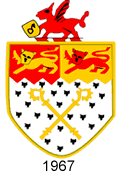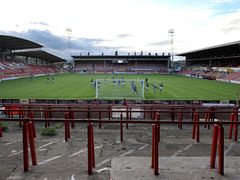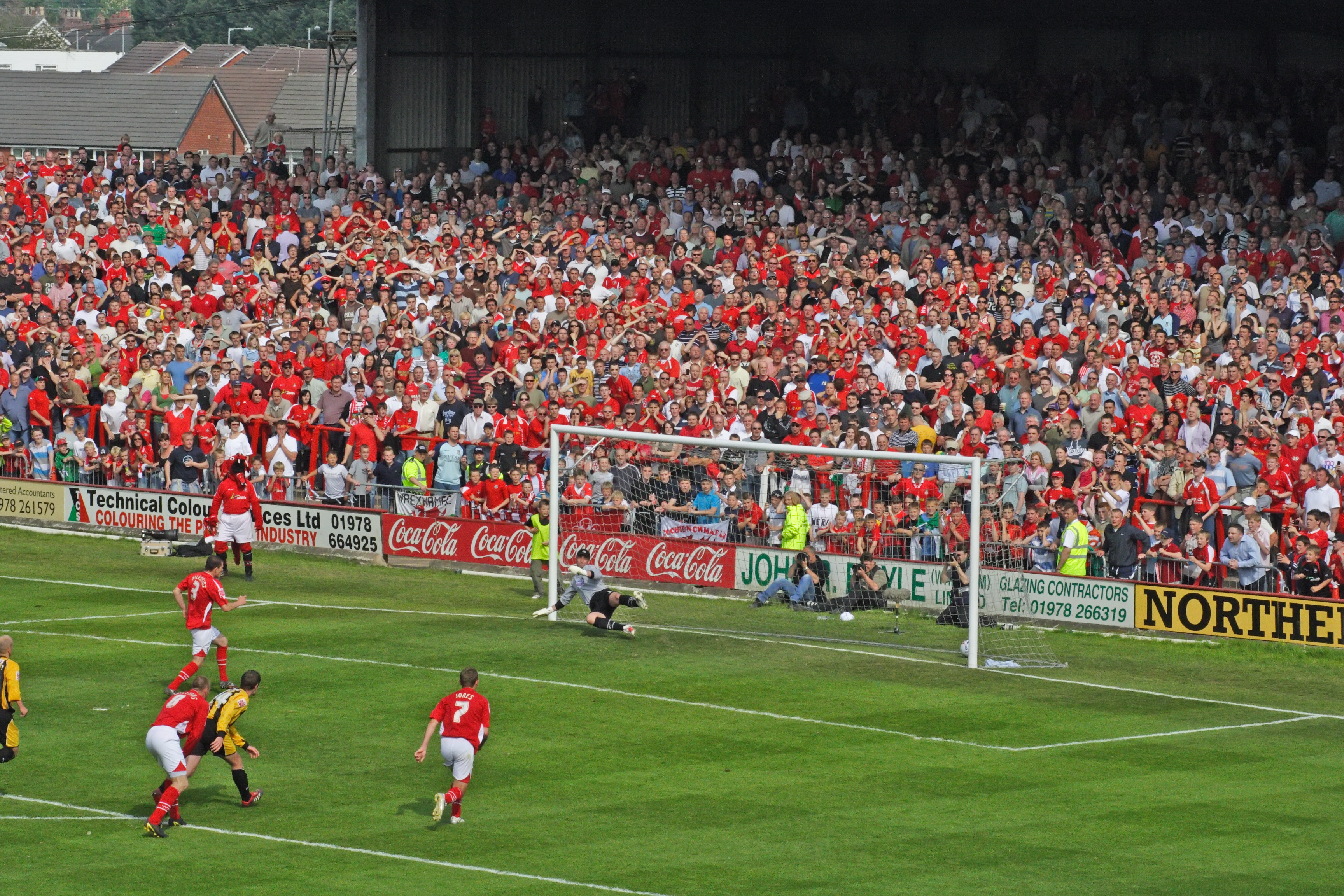
Wrexham FC are the oldest football club in Wales, having being formed in 1864 by members of Wrexham Cricket Club who sought winter recreation for their members. Wrexham is the largest town in north Wales and is located close to the English border with Chester. The Welsh name for the club is Clwb Pêl-droed Wrecsam.
The 1877-78 season saw the inaugural Welsh Cup, with Wrexham winning the final against Druids. The club played friendly games apart from the cup for the next decade, lifting the trophy once more in 1883. After crowd trouble marred the game against Oswestry in an FA Cup tie in the same year, the club were disbanded. A new outfit named Wrexham Olympic took their place, but reverted to the original title three years later.
The club were playing home games at The Racecourse Ground since 1872 when meetings took place next door in The Turf Hotel. It was also used for racing and cricket. In 1881 the cricket club raised the rent so Wrexham moved out to the Rhosddu Recreation Ground for a couple of campaigns before returning, while changing their name to Wrexham Athletic for one of them.
The club joined the Combination League in 1890, where they remained until 1894 when they became members of the Welsh League. The move only lasted for two seasons, with Wrexham winning the title on both occasions, before they returned to the Combination. The club remained in that league until 1905 as they became champions four times.
Wrexham's next port of call was the Birmingham & District League, from where they won the Welsh Cup six times to take their tally to twelve. In 1921 the club were elected to the newly formed Division Three North. While success in the league was blank, Wrexham had won the Welsh Cup fifteen times by World War Two.
The 1955-56 season saw Wrexham reach the fourth round of the FA Cup and face Matt Busby's Manchester United at The Racecourse. The 5-0 defeat attracted a record attendance of 34,445 to the ground. In 1958 'The Reds' were placed in Division Three following re-organisation of the lower leagues. Three more Welsh Cup victories had been accumulated by the time Wrexham were relegated to Division Four in 1960.
After a spell of two seasons the team were promoted under the stewardship of Player Manager Ken Barnes. Unfortunately after just two campaigns at the higher level, they were once more relegated to the League's basement, even finishing in ninety second place in 1965-66. John Neal arrived at the club as manager in 1968 to oversee the clubs most successful period.
Promotion was secured in 1969-70 and after another Welsh Cup win, they reached the second round of the European Cup Winners Cup in 1971-72 after defeating FC Zurich, with Arfon Griffiths orchestrating the midfield. This enabled The Racecourse to be improved with the construction of the new main Mold Stand.
Neal's team featuring a young Mickey Thomas went all the way to the sixth round of the FA Cup in the 1973-74 season. Wrexham defeated Shrewsbury Town, Rotherham United, Middlesbrough, Crystal Palace and Southampton before going down at Turf Moor to Burnley where 20,000 away fans travelled with them.
After the twentieth Welsh Cup victory Wrexham went all the way to the quarter finals of the Cup Winners Cup in 1975-76. Djurgardens IF of Sweden and then Polish entrants Stal Rzeszow were beaten before the Belgian giants and competition winners Anderlecht ended the run. The season ended in anti climax as The Reds needed just three points from the final four games to be promoted to the League's second tier, but they somehow failed.
John Neal departed to Middlesbrough with Griffiths taking over as Player Manager for the memorable 1977-78 season. The team were promoted as champions to Division Two while the cups also brought great reward. Wrexham reached the last eight of the League Cup before losing out 3-1 at home to Liverpool. Greater acclaim came in reaching the same stage of the FA Cup.
Burton Albion, Preston North End and Bristol City were defeated before Wrexham faced a daunting trip to St James Park to face Newcastle United. They came away with a 2-2 draw before hammering the Geordies 4-1 in the home replay. The draw for round five saw them matched with giant killers Blyth Spartans. Terry Johnson's goal looked to have put the part timers through until late drama came when a debatable twice taken corner kick allowed Dixie McNeil to fire home. The replay was played at a sell out crowd at St James Park and saw Wrexham win 2-1 to break hearts of non league fans everywhere. Arsenal ended the magnificent run with a 3-2 win in north Wales.
Highlights from this incredible era can be seen by clicking on the links below:
http://www.youtube.com/watch?v=4cZgGm-M_-U
http://www.youtube.com/watch?v=FZ5h1LwOQvo
http://www.youtube.com/watch?v=FUxCezzPUmM
Further successful FA Cup runs came in 1979-80 and 1980-81 which came to end thanks to Everton and then Wolverhampton Wanderers. Griffiths departed in 1981 to be replaced by Mel Sutton. Relegation followed back to Division Three a year later. Bobby Roberts was next in the managers chair, but he faced a thankless task as most of the talented playing staff, including the legendary Joey Jones were sold off owing to financial problems. A second successive relegation followed.
The twenty second Welsh Cup win came in 1986 with former goalscoring hero O'Neil in charge of team affairs. Slowly the team began to improve leading to a place in the play offs in the 1987-88 season. O'Neil moved on after a poor run of form the following season to be replaced by Brian Flynn. Things did not improve, and in the 1990-91 season in that Aldershot had already left the League, Wrexham finished rock bottom, thus avoiding demotion to non league football. Finances were extremely tight during that time.
The 1991-92 season gave cheer to the clubs loyal fans as after seeing off Telford United and then Winsford United they were rewarded with a home time with Arsenal. Goals from returning veteran Mickey Thomas and Steve Watkin won the game 2-1. 'The Red Dragons' went out at the next stage after a replay to West Ham United.
To see the Arsenal victory, click on: http://www.youtube.com/watch?v=b0_udb-LsB8
Flynn made a great signing in Gary Bennett for the 1992-93 season, who's goals led the team to automatic promotion. More excitement was to follow in the season after when an FA Cup run took the team to Old Trafford in the fourth round to face Manchester United. However, the game ended in a 5-2 defeat. While the team consolidated in the league, another massive FA Cup run was to come their way in the 1996-97 season.
Wins against Colwyn Bay, Scunthorpe United, West Ham United, Peterborough United and Birmingham City set up a sixth round tie away to fellow third tier side Chesterfield. The Spireites won the encounter 1-0 and were so close to reaching Wembley after an epic semi final with Middlesbrough.
At the turn of the millennium Alex Hamilton became owner of the financial troubled club. He immediately sold The Racecourse to a separate company which he owned to free up some money, with the club paying him rent to play. Relegation came in 2002 back to the bottom tier and in 2004 Hamilton gave the club a one year notice to quit so that he could develop the land where the ground stood.
Supporters were naturally in uproar and they organised themselves and received assistance from fans of other clubs who'd suffered under similar owners. Wrexham were placed into administration in December 2004, with a sizable debt being owed to the Inland Revenue. As a consequence the team were deducted ten points. This penalty condemned Denis Smith's side to relegation. Despite all the financial concerns Wrexham won the Football League Trophy in 2005 after an extra time victory over Southend United at the Millennium Stadium.
Some respite came when Hamilton's company was found to have purchased The Racecourse illegally, so it was placed back in the hands of the Administrator, despite a High Court appeal. In March 2006 the club came out of administration and was sold to Neville Dickens and his associate Geoff Moss. Results started well but dipped badly in the following campaign leading to the dismissal of Smith in January 2007. Wrexham's League status was only saved on the final day of the season with a 3-1 home win against Boston United, which relegated their opponents.
New manager Brian Carey lasted until halfway through the new season when Brian Little was brought in. Results were poor, so many players were signed in the January transfer window. Unfortunately the move did not work, with Wrexham sliding down the table before finally being relegated to the Football Conference after a 2-0 defeat at Hereford United in May 2008.
Little departed halfway through the clubs debut Conference season to be replaced by Dean Saunders. Things were still far from right off the pitch with Moss and Dickens looking to sell the financially scarred club, with some of the names banded around causing great concern. Local businesswoman Stephanie Booth and the Wrexham Supporters Trust became the preferred bidders, and after the two parties came to an agreement, the Trust eventually sealed an acrimonious deal after support from their local MP to become the new owners of the club before the start of the 2011-12 season.
A deal was done with nearby Glynwr University for them to become the new owners of The Racecourse Ground, with Wrexham becoming tenants at a fair price, with the university having use of the facilities. Saunders moved to take the Doncaster Rovers managers job in September 2011 to be replaced by new Player Manager Andy Morrell. He took the team to the end of season play offs, but the side went out to Luton Town in the semi final.
Improvement came once more on the pitch in the 2012-13 season as Morrell's side went all the way to the FA Trophy Final for the clubs first ever appearance at Wembley Stadium. Wrexham lifted the trophy against Grimsby Town following a penalty shoot out. They returned to the national stadium five weeks later after defeating Kidderminster Harriers in the semi finals of the play offs. Their re-appearance led to heartache as fellow Welsh side Newport County won the final 2-0 to return to the Football League.
Wrexham FC will play in the Football Conference in the 2013-14 season
My visits
Wrexham 1 Scarborough 0 (Saturday 31st October 1987) Division Four (att: 1,860)
Scarborough had reached the Football League and I along with my brother Nick had started travelling regularly to away games with our driver Jon 'Doomy' Dyer and Mick Young. We headed over to north Wales for this game after Jon and myself had both finished our early morning shifts at work. We went into a pub a couple of miles outside Wrexham as it was in the days when it was still a little dodgy as an away fan.
We were put into a small terrace behind the goal at The Racecourse with the seated Border Stand behind us. To our left was the seated Yale Stand with a terraced paddock in front, where the players emerged from and the directors box was located. The far end was taken up by The Kop, a terracing with a decent sized roof at the rear. The right hand side was a real mixture and partly closed to spectators. .........
It had changed since I first saw it on TV when the end where we stood was previously an open terrace and The Kop was roofless, but it had a strange raised stand in the middle with a seating deck, but it was deemed unsafe after the regulations became more stringent.
It was a sort of nothing game with not a lot happening. The home side scored the only goal at the far end. Boro didn't really look like equalising.
Wrexham 0 Scarborough 2 (Saturday 20th January 1990) Division Four (att: 1,756)
I decided to travel to this encounter on the Supporters Club coach with Bob Hall. It was a pleasant day and we were rewarded with a decent Boro performance. After soaking up all that Wrexham had to show in the first half, a Steve Richards goal from a set piece and an absolute beauty from outside the box from Martin Russell sent us back to the coach happy and dreaming of our first pints back in Scarborough.
Since my visits
Seating has been added to paddocks of the Border and Yale Stands and The Kop was closed to spectators from 2008. It is hoped that The Kop will be replaced by a new development led by Glyndwr University. The final side which was a collection of different areas was replaced by a fine new seated Mold Stand in 1999.
The images from this page have been taken from the internet as I didn't have my camera with me on either occasion. I hope to pop by in the future and enjoy beers with the nice fans I met the night before the 2013 Play Off Final, in particular my good friend Paul 'Hagar' Jones.










.jpg)
No comments:
Post a Comment